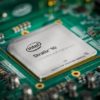Alibaba Cloud says it has built its own server chip, touting it to be compatible with the latest Armv9 architecture. The Chinese tech giant also plans to develop its own servers that will be designed for “general purpose” and “specialised AI computing”.
Custom-built by its chip development unit T-Head, the new 5nm server chip is powered by 128 Arm cores with 3.2GHz top-clock speed, according to Alibaba. Called Yitian 710, each processor has 60 billion integrated transistors and encompasses eight DDR5 channels and 96-lane PCIe 5.0, the Chinese tech vendor said in a statement Tuesday.
It added that the new chip was the first server processor to be compatible with Arm’s v9 architecture. It also would be deployed within Alibaba’s data centres.
Alibaba Cloud’s president and head of Alibaba DAMO Academy, Jeff Zhang, said: “Customising our own server chips is consistent with our ongoing efforts towards boosting our computing capabilities with better performance and improved energy efficiency. We plan to use the chips to support current and future businesses across the Alibaba Group ecosystem.”
Zhang noted that Yitian-powered servers would be tapped to support cloud services delivered to its customers in “the near future”.
Alibaba said it would develop a range of proprietary servers, called Panjiu, based on the new chip, with these systems to be designed for “optimised performance and energy efficiency”. The servers would be built for general purpose, artificial intelligence (AI) computing, and storage services.
The Chinese vendor further noted that its servers would be deployed in modules for large-scale data centres and architected to handle cloud-native workloads, including containerised applications.
When asked, Alibaba declined to specify a timeline on when the chip or systems would be operationally available.
According to Zhang, the company would continue to use various systems from its global partner network, including Intel, Nvidia, AMD, and ARM.
Alibaba said Yitian 710 clocked a score of 440 on SPECint2017, which was used to measure CPU integer processing power. The figure outpaced Arm’s current server processor by 20% in terms of performance and 50% in energy efficiency, Alibaba said.
Chip core to be made open source
Apart from its chip development plans, Alibaba further unveiled it had made open source its XuanTie CPU core, which chips were based on RISC-V architecture. The chip was launched in 2019.
Source codes of the XuanTie chip core currently are available on Github and Open Chip Community, offering developers the option to build their own chips based on the Alibaba CPU core. The Chinese vendor said the CPU architecture could be customised for Internet of Things (IoT) applications including gateway and edge servers.
Software stacks based on XuanTie, including support for various operating systems such as Linux, Android, and Alibaba’s AliOS, also would be made open source, Alibaba said. It added that further services and development tools and SDKs (software development kits) would be made available in future.
Zhang said: “By opening up the IP cores of our in-house IoT processors as well as related software stacks and development tools, we aim to assist global developers to build their own RISC-V-based chips in a much more cost-effective way. We hope this move can encourage more innovation amongst the thriving RISC-V software community and, as a result, help people enjoy the benefits of a connected world in the digital era.”
Alibaba in 2019 released its first AI chip, Hanguang 800, which since had been rolled out in its cloud data centres to support various services such as search, recommendation, and live streaming. While asked, the vendor declined to provide figures on how many unit of the AI processor had been deployed.
Alibaba last year said it would invest 200 billion yuan ($31.07 billion) in its cloud business over three years, focusing on infrastructure development including servers, chips, network, and operating system. It then also announced plans to deploy proprietary technologies in its data centres “in the coming years”.


